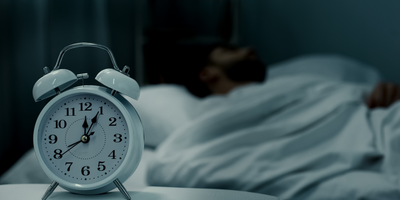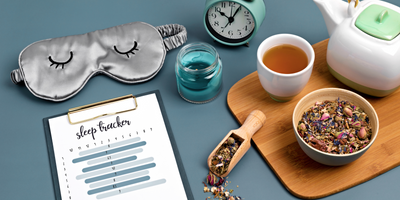
7 Secrets To Good Night's Sleep
Understanding the Role of Sleep Hygiene in Promoting Good Night's Sleep
Sleep hygiene encompasses a variety of habits and behaviors that can help you attain a good night's sleep. This includes practices such as maintaining a consistent sleep schedule, creating a calming bedtime routine, and making your sleep environment conducive for restful sleep.
Firstly, adhering to a consistent sleep schedule – going to bed and waking up at the same time every day, even on weekends – helps regulate your body's internal clock, promoting better sleep at night. This can be challenging for people with erratic work schedules or those who enjoy late-night social activities, but the payoff in terms of improved sleep quality is significant.
Secondly, establishing a calming bedtime routine signals your body that it's time to wind down and go to sleep. This routine could include activities like reading, taking a warm bath, or practicing mindfulness meditation. However, avoid stimulating activities such as using electronic devices, as the blue light emitted can interfere with the production of the sleep-inducing hormone melatonin.
The third aspect of sleep hygiene involves optimising your sleep environment. This includes factors like the firmness of your mattress, the type and number of pillows you use, the temperature in your bedroom, and the amount of light and noise. Each person's preferences may vary; thus, it might take some trial and error to find what works best for you.
Despite the clear benefits, good sleep hygiene can be hard to maintain, especially in today's fast-paced society. It requires discipline and a long-term commitment, which can be challenging. However, the payoff in terms of improved sleep quality and overall health is significant.
The Impact of Diet and Nutrition on Sleep Quality and Duration
Diet and nutrition play a critical role in sleep quality and duration. Certain foods and beverages can either help or hinder your sleep, depending on their composition.
For instance, foods rich in tryptophan (an amino acid that helps produce melatonin), such as turkey and milk, can promote better sleep. Similarly, foods high in magnesium and calcium, like leafy greens and dairy products, can also enhance sleep quality by aiding the functioning of the nervous system.
Conversely, consuming high amounts of caffeine, alcohol, or sugar can adversely affect your sleep. While alcohol might help you fall asleep faster initially, it disrupts your sleep cycles later in the night. Similarly, caffeine, a powerful stimulant, can prevent you from falling asleep if consumed too close to bedtime.
Despite this knowledge, maintaining a balanced, sleep-friendly diet can be challenging due to various reasons such as work-related stress, personal preferences, and social events. However, by making mindful choices and adjusting your eating schedule, you can significantly improve your sleep quality.
The Role of Physical Activity in Promoting Restful Sleep
Regular physical activity is another key component to achieving restful sleep. Exercise helps regulate your body's internal clock, reduce stress, and improve mood – all of which contribute to better sleep.
Physical activities, particularly those performed outdoors, can help increase your exposure to natural light, reinforcing your body's circadian rhythm. Moreover, exercise is known to reduce levels of cortisol, the body's primary stress hormone, thereby enhancing sleep quality.
However, the timing of your workouts matters. Engaging in high-intensity exercise too close to bedtime can interfere with your sleep as it elevates your heart rate and body temperature. Ideally, try to finish exercising at least three hours before you plan to go to bed.
Incorporating physical activity into your daily routine can be challenging, especially with busy schedules and other commitments. However, even moderate exercise such as walking or yoga can confer sleep benefits.
Taking Deep Sleep Supplements: Exploring the Effectiveness and Safety
Over-the-counter sleep supplements such as melatonin, valerian root, and magnesium have gained popularity as aids to promote deep and restful sleep. They work by increasing the levels of sleep-inducing substances in your body, helping you fall asleep faster and stay asleep longer.
Melatonin supplements can be particularly effective for people suffering from jet lag or those working shift schedules that disrupt their natural sleep-wake cycle. Valerian root and magnesium are thought to promote sleep by reducing anxiety and promoting relaxation.
However, it's essential to approach these sleep supplements with caution. While they can be effective, they are not a long-term solution and can sometimes lead to dependence. Moreover, they can interact with other medications and have side effects. Always consult with a healthcare provider before starting any supplement regimen.
The Influence of Stress Management Techniques on Sleep Quality
Stress and sleep have a reciprocal relationship. High stress levels can lead to sleep disturbances, and in turn, inadequate sleep can exacerbate stress. Thus, managing stress is crucial for good sleep.
Various stress management techniques can improve sleep quality, including mindfulness meditation, deep breathing exercises, yoga, and progressive muscle relaxation. These methods work by activating the body's relaxation response, reducing heart rate, blood pressure, and cortisol levels, thereby promoting better sleep.
The challenge with these techniques is consistency. They require regular practice to be effective, and finding the time and discipline to incorporate them into a daily routine can be difficult for some people.
The Impact of Environmental Factors on Sleep: Noise, Light, and Temperature

Your sleep environment can significantly influence your sleep quality. Three main environmental factors affect sleep: noise, light, and temperature.
Excessive noise can disrupt your sleep, causing you to wake up or shift between stages of sleep. Using earplugs, a white noise machine, or soundproofing your room can help mitigate noise disturbances.
Light also plays a significant role in sleep. Our bodies use light cues to regulate our sleep-wake cycle. Therefore, limiting exposure to artificial light in the evening and maximising exposure to natural light during the day can enhance sleep quality.
Lastly, the temperature of your sleep environment can affect your sleep. Most people sleep best in a slightly cool room, around 65 degrees Fahrenheit (18 degrees Celsius). However, personal preferences may vary.
Balancing these environmental factors to create the ideal sleep environment can be a challenge. However, small adjustments can significantly improve your sleep quality.
The Relationship Between Sleep and Mental Health: A Bidirectional Perspective
Sleep and mental health are closely intertwined. Sleep disturbances can be a symptom of a mental health disorder, and at the same time, chronic sleep problems can contribute to the onset or exacerbation of mental health conditions. This complex, bidirectional relationship necessitates a holistic approach to diagnosis and treatment.
Conditions such as anxiety, depression, bipolar disorder, and ADHD often co-occur with sleep problems. In these cases, treating the underlying mental health condition can significantly improve sleep quality. Therefore, if you're struggling with persistent sleep issues, it's crucial to explore the possibility of an underlying mental health disorder.
Conversely, chronic sleep deprivation or disorders like insomnia can increase the risk of developing mental health conditions. In this context, addressing the sleep problem can help prevent or alleviate the mental health issue.
While the interplay between sleep and mental health is well-established, it can be challenging to disentangle the two and establish which came first. This challenge underscores the importance of comprehensive mental and physical health assessments in diagnosing and treating sleep problems.
Summary
Understanding the Role of Sleep Hygiene in Promoting Good Night's Sleep- Sleep hygiene involves habits and behaviors crucial for good sleep, such as maintaining a consistent sleep schedule and creating a calming bedtime routine.
- Consistency in sleep schedules helps regulate the body's internal clock, while a relaxing bedtime routine signals the body to prepare for sleep. However, maintaining these practices requires discipline and can be challenging in a fast-paced lifestyle.
- Diet significantly affects sleep quality, with foods rich in tryptophan, magnesium, and calcium promoting better sleep, while caffeine and alcohol can disrupt it.
- Balancing a diet for sleep can be difficult due to lifestyle and social factors, but mindful eating choices and timing can greatly enhance sleep quality.
- Regular exercise, especially outdoors, helps regulate the body's circadian rhythm and reduces stress, leading to better sleep.
- Timing of exercise is crucial; it's recommended to avoid high-intensity workouts close to bedtime. Incorporating even moderate exercise into a busy schedule can improve sleep.
- Supplements like melatonin and valerian root can aid sleep but should be used cautiously as they are not long-term solutions and can have side effects.
- Consulting healthcare providers before starting supplements is crucial, especially to avoid potential interactions with other medications.
- Techniques like mindfulness and yoga activate the body's relaxation response, essential for good sleep, but require regular practice and commitment.
- Consistently incorporating these techniques into daily routines can be challenging but is vital for managing stress and improving sleep.
- Sleep quality is significantly influenced by environmental factors like noise, light, and temperature, necessitating adjustments for an ideal sleep environment.
- Strategies like using earplugs, controlling light exposure, and maintaining a cool room temperature can greatly enhance sleep quality, though personal preferences may vary.
- Sleep problems can both be a symptom and a cause of mental health issues, highlighting the need for a holistic approach in treatment.
- Addressing sleep issues is crucial in managing mental health conditions, and vice versa, but distinguishing the primary issue can be complex and requires comprehensive health assessments.
Deep Sleep Support
We’ve created a Deep Sleep Supporting supplement with a combination of the best available ingredients proven to assist in a better night’s sleep. This supplement is an easy-to-mix, great-tasting powder, offering a therapeutic dose of the nutrients your body needs to relax and fall asleep. Learn more about it here.







